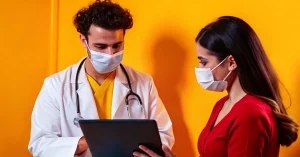MBBS in Russia is and has been a popular choice for students seeking quality medical education abroad. Known for its high-quality education, affordable tuition fees, and well-established medical universities, MBBS in Russia offers a great opportunity for students worldwide to study medicine. But how exactly does one become a doctor in Russia? In this blog, we’ll guide you through the process of studying MBBS in Russia, from the admission requirements to the licensing process, ensuring you have all the information you need to make this exciting journey a reality.
Understanding the Medical Education System of Russia

Before diving into the topic, it’s important to understand Russia’s medical education system. The country offers an affordable yet globally recognized system that integrates European and Traditional Soviet methodologies.
However, earning an MBBS degree is not the final step; medical graduates must pass two crucial exams before they can practice medicine in Russia or apply for international licensing. These are the State Exam (GOZZ / GOSS Exam / MD-Degree Exam) and the Licensing or Accreditation Exam. These exams aim to assess the candidates’ theoretical understanding, practical skills, and readiness to handle real-life situations.
To graduate and practice medicine as a doctor, students must pass the GOZZ exam, which grants them an MD-Physician degree equivalent to an MBBS in India. However, to practice medicine as a profession in Russia, students must clear the Licensing / Accreditation Examination.
The GOZZ Exam: The Gateway to MD Degree in Russia
The GOZZ (also called GOSS) Exam is an essential final-year assessment that evaluates a medical student’s theoretical understanding and clinical expertise. Conducted by individual universities, the exam is independent of direct government supervision. Depending on the university, students may take the exam either in English or Russian.
GOZZ Exam: Understanding the Exam Structure
The GOZZ exam is designed to test students across three critical areas:
- Written Examination: The segment consists of multiple-choice questions (MCQs) covering various medical disciplines. Students must demonstrate their grasp of essential medical concepts and problem-solving abilities.
- Practical Examination: Here, students are required to assess a patient’s medical history, lab reports, and symptoms to arrive at a diagnosis and suggest treatment options. This phase ensures that students can translate theoretical knowledge into practical decision-making.
- Viva-Voce (Oral Examination): Conducted by the university’s faculty, this segment assesses a student’s ability to articulate medical concepts, engage in diagnostic reasoning, and handle real-time medical case discussions.
Significance of the Gozz Exam
Successfully passing the examination is mandatory for obtaining the MD-Physician degree. Without clearing this stage, students cannot progress to the licensing exam, which is required for professional medical practice in Russia. This exam acts as the final academic evaluation before graduates step into the real world of medicine.
The Licensing Exam: Practice Medicine in Russia
While the GOZZ Exam grants students their medical degrees, the Licensing Exam (Accreditation Exam) is essential for those who wish to practice medicine professionally in Russia. This national-level assessment ensures that doctors meet the required standards to work within the Russian healthcare system.
Licensing Exam: Your Key to Practice Medicine in Russia
The accreditation exam comprises these essential components:
- Online Examination: Conducted entirely in Russian, this segment of the exam features 40 questions from a pool of 800 sample questions. A minimum passing score of 50% is required. Since the exam is held once a year, typically in June, students must prepare meticulously. Medical universities in Russia often provide Russian medical terminology courses to aid non-native speakers.
- Clinical Skill Examination (Hospital-Based): This is a hands-on assessment in which students diagnose a patient’s illness based on symptoms, test results, and medical history.
- Clinical Skills Examination (Online): Similar to the hospital-based clinical skill examination, this phase takes place in a virtual setting. Students must analyze 12-case-based questions and propose diagnosis and treatment accordingly.
Preparing for the Exam: Strategies for Success
Given the significance of these exams, effective preparation is key. Here are some expert-recommended strategies to help students maximize their chances of success:
- Build a Strong Theoretical Foundation
Medical students must thoroughly revise core subjects such as anatomy, pathology, pharmacology, and internal medicine. Utilizing well-recognized textbooks and online resources will help reinforce key concepts and enhance problem-solving skills.
- Strengthen Your Medical Russian Proficiency
Since the Licensing Exam is conducted in Russian, it is crucial for students to familiarize themselves with medical terminology in Russian. Attending language courses offered by universities and practicing clinical case discussions in Russian can significantly improve comprehension and confidence.
- Engage in Practical Training
Since both the GOZZ and Licensing Exams include practical assessments, students must focus on clinical case studies and hospital training. Observing real-life patient interactions, working alongside senior doctors, and participating in hands-on training will enhance diagnostic and decision-making skills.
- Practice with Past Exam Questions
Practicing multiple-choice questions (MCQs) from previous exams will help students understand the format and improve their response time. Many universities provide question banks, which are invaluable for self-assessment and preparation.
- Improve Communication Skills for the Viva Exam
To perform well in the Viva-Voce, students should engage in group discussions, practice explaining medical cases clearly, and participate in mock oral exams. Being able to articulate medical concepts confidently is crucial for success in this segment.
Summing it Up
Successfully passing the GOZZ and Licensing Exams is a crucial milestone for medical students in Russia. These exams not only grant students their medical degrees but also enable them to practice professionally. By understanding the exam structure, preparing strategically, and mastering medical Russian, students can significantly enhance their chances of success.
Whether your goal is to practice medicine in Russia or apply for medical licensing in other countries, excelling in these exams will be a defining step in your journey as a doctor. With consistent effort, smart preparation, and a deep commitment to learning, achieving success in these exams is within reach. Stay focused, prepare thoroughly, and embrace the path to becoming a medical professional!
Frequently Asked Questions

-
What is the cost of MBBS in Russia?
The cost of studying MBBS in Russia may vary as per the university you choose. However, the average fee for studying MBBS in Russia is around INR 15 Lakhs- INR 50 Lakhs.
-
Can I practice in India after completing my MBBS in Russia?
Yes, students can practice medicine in Russia after completing MBBS in Russia provided they qualify for the FMGE examination- the Medical Licensure Examination of India.
-
What are the challenges of studying MBBS in Russia?
The challenges while studying MBBS in Russia may include, adjusting to a new culture, and language barrier.
-
Is NEET required for MBBS admission in Russia?
Yes, NEET is mandatory for MBBS Admission in Russia.
-
How do Russian medical universities compare to Indian medical colleges?
Russian medical universities typically provide high-quality medical education at a much lower cost than Indian medical colleges. Their degrees are globally recognized, which makes these institutions a popular choice for international students, especially from India.





1 Comment
Comments are closed.